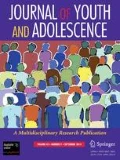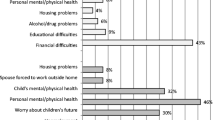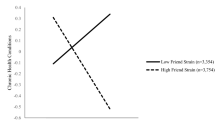Abstract
The purpose of this study was to apply an Integrative predictive model to examine interrelationships among parental support, adaptive coping strategies, and psychological adjustment among late adolescents. Findings using new measures of parental support and adaptive coping with 241 eighteen-year-old college freshmen supported hypotheses. Social support from both mother and father and a nonconflictual relationship between parents were positively associated with adolescents' psychological adjustment. Adolescents with high parental support were better adjusted and less distressed than were those with low parental support. Additionally, an integrative structural equation model showed that parental support was associated with psychological adjustment both directly and indirectly through a higher percent of approach coping strategies.
Similar content being viewed by others
References
Avison, W. R., and McAlpine, D. D. (1992). Gender differences in symptoms of depression among adolescents.J. Health Social Behav. 33: 77–96.
Bandura, A. (1982). Self-efficacy mechanism in human agency.Am. Psychol. 37: 122–147.
Borrine, M. L., Handal, P. J., Brown, N. Y., and Searight, H. R. (1991). Family conflict and adolescent adjustment in intact, divorced, and blended families.J. Consult. Clin. Psychol. 59: 753–755.
Cantor, N., and Langston, C. A. (1989). Ups and downs of life tasks in a life transition. In Pervin, L. A. (ed.),Goal Concepts in Personality and Social Psychology. Erlbaum, Hillsdale, NJ.
Compas, B. E. (1987). Coping with stress during childhood and adolescence.Psychol. Bull. 101: 393–403.
Compas, B. E., MaIcarne, V. L., and Fondacaro, K. M. (1988). Coping with stressful events in older children and young adolescents.J. Consult. Clin. Psychol. 56: 405–411.
Crean, H. F. (1994). Adjustment in Hispanic middle school students: An integrative model of risk and protective factors. Unpublished doctoral dissertation, University of Texas at Austin.
Cronkite, R. C., and Moos, R. H. (1984). The role of predisposing and moderating factors in the stress-illness relationship.J. Health Social Behav. 25: 372–393.
Cutrona, C. E. (1989). Ratings of social support by adolescents and adult informants: Degree of correspondence and prediction of depressive symptoms.J. Personal. Social Psychol. 57: 723–730.
Daniels, D., and Moos, R. H. (1990). Assessing life Stressors and social resources among adolescents: Applications to depressed youth.J. Adoles. Res. 5: 268–289.
Ebata, A. T., and Moos, R. H. (1991). Coping and adjustment in distressed and healthy adolescents.J. Appl. Develop. Psychol. 12: 33–54.
Eisen, P. (1986). Adolescence: Coping strategies and vulnerabilities.Int. J. Adolesc. Health 2: 107–117.
Fleishman, J. A. (1984). Personality characteristics and coping patterns.J. Health Social Behav. 25: 229–244.
Forsythe, C. J., and Compas, B. E. (1987). Interaction of cognitive appraisals of stressful events and coping: Testing the goodness of fit hypothesis.Cog. Ther. Res. 11: 473–385.
Garmezy, N. (1985). Stress-resistant children: The search for protective factors. In Stevenson, J. E. (ed.),Recent Research in Developmental Psychopathology. Pergamon Press, Oxford.
Grotevant, H., and Cooper, C. (1985). Patterns of interaction in family relationships and the development of identity exploration in adolescence.Child Devel. 56: 415–428.
Grych, J. H., and Finchman, F. D. (1990). Marital conflict and children's adjustment: A cognitive-contextual framework.Psychol. Bull. 108: 267–290.
Harter, S. (1986).Self-Perception Profile for Adolescents. Department of Psychology, University of Denver, Denver, CO.
Hoffman, J. A., and Weiss, B. (1987). Family dynamics and presenting problems in college students.J. Consult. Psychol. 34: 157–163.
Hoffman, M. A., Levy-Shiff, R., Solberg, S. C., and Zarizki, J. (1992). The impact of stress and coping: Developmental changes in the transition to adolescence.J. Youth Adolesc. 27: 451–469.
Holahan, C. J., and Moos, R. H. (1987). Personal and contextual determinants of coping strategies.J. Personal. Social Psychol. 52: 946–955.
Holahan, C. J., and Moos, R. H. (1990). Life Stressors, resistance factors, and improved psychological functioning: An extension of the stress resistance paradigm.J. Personal. Social Psychol. 58: 909–917.
Holahan, C. J., and Moos, R. H. (1991). Life Stressors, personal and social resources, and depression: A 4-year structural model.J. Abnorm. Psychol. 100: 31–38.
Holahan, C. J., and Moos, R. H. (1994). Life Stressors and mental health: Advances in conceptualizing stress resistance. In Avison, W. R., and Gotlib, I. H. (eds.),Stress and Mental Health: Contemporary Issues and Prospects for the Future. Plenum, New York.
Holahan, C. J., Moos, R. H., Holahan, C. K., and Brennan, P. L. (1995). Social support, coping, and depressive symptoms in a late middle-aged sample of patients reporting cardiac illness.Health Psychol. 14: 152–163.
Jöreskog, K. G., and Sörbom, D. (1989).LISREL 7: A Guide to the Program and Applications (2nd ed.). SPSS, Chicago, IL.
Lazarus, R. S., and Folkman, S. (1984).Stress, Appraisal, and Coping. Springer, New York.
Luthar, S. S., and Zigler, E. (1991). Vulnerability and competence: A review of research on resilience in childhood.Am. J. Orthopsychiat. 61: 6–22.
Maughan, B., and Champion, L. (1990). Risk and protective factors in the transition to young adulthood. In Baltes, P. B., and Baltes, M. M. (eds.),Successful Aging: Perspectives from the Behavioral Sciences. Cambridge University Press, Cambridge.
Moos, R. H. (1993).Coping Responses Inventory—Youth Form Manual. Psychological Assessment Resources, Odessa, FL.
Moos, R. H., and Moos, B. S. (1994).Life Stressors and Social Resources Inventory—Youth Form Manual. Psychological Assessment Resources, Odessa, FL.
Moos, R. H., and Schaefer, J. A. (1993). Coping resources and processes: Current concepts and measures. In Goldberger, L., and Breznitz, S. (eds.),Handbook of Stress: Theoretical and Clinical Aspects (2nd ed.). Free Press, New York.
Phares, V., and Compas, B. E. (1992). The role of fathers in child and adolescent psychopathology: Make room for daddy.Psychol. Bull. 11: 387–412.
Pierce, G. R., Sarason, I. G., and Sarason, B. R. (1991). General and relationship-based perceptions of social support: Are two constructs better than one?J. Personal. Social Psychol. 61: 1028–1039.
Powers, S. I., Hauser, S. T., and Kilner, L. A. (1989). Adolescent mental health.Am. Psychol. 44: 200–208.
Rice, K. G., Cole, D. A., and Lapsley, D. K. (1990). Separation-individuation, family cohesion, and adjustment to college: Measurement validation and a test of a theoretical model.J. Counsel. Psychol. 37: 195–202.
Roth, S., and Cohen, L. J. (1986). Approach, avoidance, and coping with stress.Am. Psychol. 41: 813–819.
Rutter, M. (1987). Psychosocial resilience and protective mechanisms.Am. J. Orthopsychiat. 57: 316–331.
Shulman, S., Seiffge-Krenke, I., and Samet, N. (1987). Adolescent coping style as a function of perceived family climate.J. Adoles. Res. 2: 367–381.
Spielberger, C. D. (1973).Children's State-Trait Anxiety Inventory. Consulting Psychologists Press, Palo Alto, CA.
Stark, L. J., Spirito, A., Williams, C. A., and Guevremont, D. C. (1989). Common problems and coping strategies: I. Findings with normal adolescents.J. Abnorm. Child Psychol. 17: 203–212.
Stern, M., and Zevon, M. A. (1990). Stress, coping, and family environment: The adolescent's response to naturally occurring Stressors.J. Adoles. Res. 5: 290–305.
Stewart, A. J., Sokol, M., Healy, J. M., and Chester, N. L. (1986). Longitudinal studies of psychological consequences of life changes in children and adults.J. Personal. Social Psychol. 50: 143–157.
Thoits, P. A. (1986). Social support as coping assistance.J. Consult. Clin. Psychol. 54: 416–423.
Vitaliano, P. P., Maiuro, R. D., and Russo, J. (1987). Raw versus relative scores in the assessment of coping strategies.J. Behav. Med. 10: 1–19.
Weinberger, D. (1989). Social-emotional adjustment in older children and adults: I. Psychometric properties of the Weinberger Adjustment Inventory. Department of Psychology, Stanford University, Stanford, CA.
Author information
Authors and Affiliations
Additional information
This work was supported in part by grants from the Hogg Foundation for Mental Health, the University Research Institute, University of Texas at Austin, and the William T. Grant Foundation.
Received Ph.D. in clinical psychology from the University of Massachusetts, Amherst. Research interests include stress and coping processes among adolescents and adults and coping with chronic illness.
Research interests include adolescent coping and development and anxiety processes.
Received Ph.D. in clinical psychology from the University of California, Berkeley. Research interests include social ecological perspectives on psychological functioning, health services research and evaluation, depression, and alcoholism.
Rights and permissions
About this article
Cite this article
Holahan, C.J., Valentiner, D.P. & Moos, R.H. Parental support, coping strategies, and psychological adjustment: An integrative model with late adolescents. J Youth Adolescence 24, 633–648 (1995). https://doi.org/10.1007/BF01536948
Received:
Accepted:
Issue Date:
DOI: https://doi.org/10.1007/BF01536948




